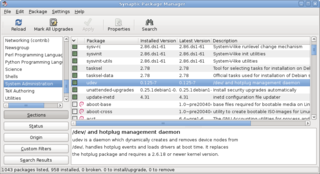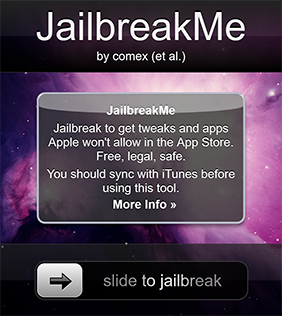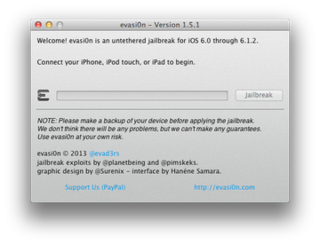
A package manager or package-management system is a collection of software tools that automates the process of installing, upgrading, configuring, and removing computer programs for a computer in a consistent manner.
Darwin is the core Unix operating system of macOS, iOS, watchOS, tvOS, iPadOS, visionOS, and bridgeOS. It previously existed as an independent open-source operating system, first released by Apple Inc. in 2000. It is composed of code derived from NeXTSTEP, BSD, Mach, and other free software projects' code, as well as code developed by Apple.

Advanced package tool, or APT, is a free-software user interface that works with core libraries to handle the installation and removal of software on Debian, and Debian-based Linux distributions. APT simplifies the process of managing software on Unix-like computer systems by automating the retrieval, configuration and installation of software packages, either from precompiled files or by compiling source code.

The Fink project is an effort to port and package open-source Unix programs to macOS. Fink uses dpkg and APT, as well as its own frontend program, fink.

aptitude is a front-end to APT, the Debian package manager. It displays a list of software packages and allows the user to interactively pick packages to install or remove. It has a search system utilizing flexible search patterns. It was initially created for Debian, but has appeared in RPM-based distributions as well.
Comparison of the Java and .NET platforms.
SpringBoard is the standard application that manages the iPhone's home screen. Other tasks include starting WindowServer, launching and bootstrapping applications and setting some of the device's settings on startup.
The Android Package with the file extension apk is the file format used by the Android operating system, and a number of other Android-based operating systems for distribution and installation of mobile apps, mobile games and middleware. A file using this format can be built from source code written in either Java or Kotlin.
On Apple devices running iOS and iOS-based operating systems, jailbreaking is the use of a privilege escalation exploit to remove software restrictions imposed by the manufacturer. Typically it is done through a series of kernel patches. A jailbroken device permits root access within the operating system and provides the right to install software unavailable through the App Store. Different devices and versions are exploited with a variety of tools. Apple views jailbreaking as a violation of the end-user license agreement and strongly cautions device owners not to try to achieve root access through the exploitation of vulnerabilities.

Cydia is a graphical user interface of APT for iOS. It enables a user to find and install software not authorized by Apple on jailbroken iPhones, iPads and iPod Touch devices. It also refers to digital distribution platform for software on iOS accessed through Cydia software. Most of the software packages available through Cydia are free of charge, although some require purchasing.

Installer.app was a freeware software installer for the iPhone created by Nullriver and later maintained by RipDev, first released in summer 2007 and maintained until summer 2009. Installer allowed users to install third-party applications into the iPhone's Applications directory where native applications are kept. Users could install applications from a variety of sources provided by software developers or directly onto the iPhone without requiring a computer. Users could browse lists of applications inside Installer to find ones they wanted to install. In June 2009, RipDev dropped support for Installer in favor of developing a different package manager and installer named Icy.
A mobile development framework is a software framework that is designed to support mobile app development. It is a software library that provides a fundamental structure to support the development of applications for a specific environment.
blackra1n is a program that jailbreaks versions 3.1, 3.1.1 and 3.1.2 of Apple's operating system for the iPhone and the iPod Touch, known as iOS.

JailbreakMe is a series of jailbreaks for Apple's iOS mobile operating system that took advantage of flaws in the Safari browser on the device, providing an immediate one-step jailbreak, unlike more common jailbreaks, such as Blackra1n and redsn0w, that require plugging the device into a computer and running the jailbreaking software from the desktop. JailbreakMe included Cydia, a package management interface that serves as an alternative to the App Store. Although it does not support modern devices, it can still be used and the site is up.
Sideloading describes the process of transferring files between two local devices, in particular between a personal computer and a mobile device such as a mobile phone, smartphone, PDA, tablet, portable media player or e-reader.

Evasi0n,, is a untethered jailbreak program for iOS 6.0 - 6.1.2 and for iOS 7.0 - 7.0.6. It is known for a portable code base and minimal use of arbitrary code execution. More than seven million copies of Evasi0n were downloaded in the first four days after release. It was released on 4 February 2013. Four of the six exploits used were patched by Apple on 18 March 2013 with the release of iOS 6.1.3. On 22 December 2013, the evad3rs released a new version of evasi0n that supports iOS 7.x, known as evasi0n7. One major exploit used by this jailbreak was patched by Apple with the 4th beta of iOS 7.1 and two more with beta 5. The final release of iOS 7.1 fixed all the exploits used by evasi0n7.
The Pangu Team, is a Chinese programming team in the iOS community that developed the Pangu jailbreaking tools. These are tools that assist users in bypassing device restrictions and enabling root access to the iOS operating system. This permits the user to install applications and customizations typically unavailable through the official iOS App Store.

Android Runtime for Chrome (ARC) is a compatibility layer and sandboxing technology for running Android applications on desktop and laptop computers in an isolated environment. It allows applications to be safely run from a web browser, independent of user operating system, at near-native speeds.

DevEco Studio is the official integrated development environment (IDE) for Huawei's HarmonyOS operating system, built on JetBrains' IntelliJ IDEA software and Huawei's SmartAssist designed specifically for HarmonyOS development. It is available for download on Microsoft Windows and macOS based operating systems.







